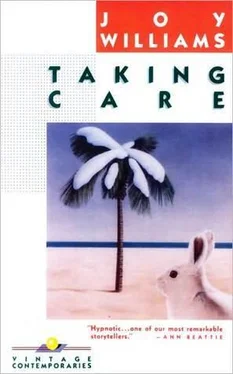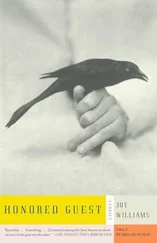Joy Williams - Taking Care
Здесь есть возможность читать онлайн «Joy Williams - Taking Care» весь текст электронной книги совершенно бесплатно (целиком полную версию без сокращений). В некоторых случаях можно слушать аудио, скачать через торрент в формате fb2 и присутствует краткое содержание. Год выпуска: 2010, Издательство: Vintage, Жанр: Современная проза, на английском языке. Описание произведения, (предисловие) а так же отзывы посетителей доступны на портале библиотеки ЛибКат.
- Название:Taking Care
- Автор:
- Издательство:Vintage
- Жанр:
- Год:2010
- ISBN:нет данных
- Рейтинг книги:5 / 5. Голосов: 1
-
Избранное:Добавить в избранное
- Отзывы:
-
Ваша оценка:
- 100
- 1
- 2
- 3
- 4
- 5
Taking Care: краткое содержание, описание и аннотация
Предлагаем к чтению аннотацию, описание, краткое содержание или предисловие (зависит от того, что написал сам автор книги «Taking Care»). Если вы не нашли необходимую информацию о книге — напишите в комментариях, мы постараемся отыскать её.
Taking Care — читать онлайн бесплатно полную книгу (весь текст) целиком
Ниже представлен текст книги, разбитый по страницам. Система сохранения места последней прочитанной страницы, позволяет с удобством читать онлайн бесплатно книгу «Taking Care», без необходимости каждый раз заново искать на чём Вы остановились. Поставьте закладку, и сможете в любой момент перейти на страницу, на которой закончили чтение.
Интервал:
Закладка:
She and the man travel all over the South in his white convertible. The girl brings dolls and sandals and sugar animals back to the child. Sometimes the child travels with them. She sits beside them, pretending to do something gruesome to her eyes. She pretends to dig out her eyes. The girl ignores this. The child is tanned and sturdy and affectionate although sometimes, when she is being kissed, she goes limp and even cold, as though she has suddenly, foolishly died. In the restaurants they stop at, the child is well-behaved although she takes only butter and ice water. The girl and the man order carefully but do not eat much either. They move the food around on their plates. They take a bite now and then. In less than a month the man has spent many hundreds of dollars on food that they do not eat. Action Line says that an adult female consumes seven hundred pounds of dry food in a single year. The girl believes this of course but it has nothing to do with her. Sometimes, she greedily shares a bag of Fig Newtons with the child but she seldom eats with the man. Her stomach is hard, flat, empty. She feels hungry always, dangerous to herself, and in love. They leave large tips on the tables of restaurants and then they reenter the car. The seats are hot from the sun. The child sits on the girl’s lap while they travel, while the leather cools. She seems to want nothing. She makes clucking, sympathetic sounds when she sees animals smashed flat on the side of the road. When the child is not with them, they travel with the man’s friends.
The man has many friends whom he is devoted to. They are clever and well-off; good-natured, generous people, confident in their prolonged affairs. They have known each other for years. This is discomforting to the girl, who has known no one for years. The girl fears that each has loved the other at one time or another. These relationships are so complex, the girl cannot understand them! There is such flux, such constancy among them. They are so intimate and so calm. She tries to imagine their embraces. She feels that theirs differ from her own. One afternoon, just before dusk, the girl and man drive a short way into the Everglades. It is very dull. There is no scenery, no prospect. It is not a swamp at all. It is a river, only inches deep! Another couple rides in the back of the car. They have very dark tans and have pale yellow hair. They look almost like brother and sister. He is a lawyer and she is a lawyer. They are drinking gin and tonics, as are the girl and the man. The girl has not met these people before. The woman leans over the back seat and drops another ice cube from the cooler into the girl’s drink. She says, “I hear that you have a little daughter.” The girl nods. She feels funny, a little frightened. “The child is very sortable, ” the girl’s lover says. He is driving the big car very fast and well but there seems to be a knocking in the engine. He wears a long-sleeved shirt buttoned at the wrists. His thick hair needs cutting. The girl loves to look at him. They drive, and on either side of them, across the slim canals or over the damp saw grass, speed airboats. The sound of them is deafening. The tourists aboard wear huge earmuffs. The man turns his head toward her for a moment. “I love you,” she says. “Ditto,” he says loudly, above the clatter of the airboats. “Double-ditto.” He grins at her and she begins to giggle. Then she sobs. She has not cried for many months. Everyone is astounded. The man drives a few more miles and then pulls into a gas station. The girl feels desperate about this man. She would do the unspeakable for him, the unforgivable, anything. She is lost but not in him. She wants herself lost and never found, in him. “I’ll do anything for you,” she cries. “Take an aspirin,” he says. “Put your head on my shoulder.”
The girl is sleeping alone in her apartment. The man has gone on a business trip. He assures her he will come back. He’ll always come back, he says. When the girl is alone she measures her drink out carefully. Carefully, she drinks twelve ounces of bourbon in two and a half hours. When she is not with the man, she resumes her habit of listening to the radio. Frequently, she hears only the replies of Action Line. “Yes,” the Answer Man says, “in answer to your question, the difference between rising every morning at six or at eight in the course of forty years amounts to twenty-nine thousand two hundred hours or three years, two hundred twenty-one days and sixteen hours, which are equal to eight hours a day for ten years. So that rising at six will be the equivalent of adding ten years to your life.” The girl feels, by the Answer Man’s tone, that he is a little repulsed by this. She washes her whiskey glass out in the sink. Balloons are drifting around the kitchen. They float out of the kitchen and drift onto the balcony. They float down the hall and bump against the closed door of the child’s room. Some of the balloons don’t float but slump in the corners of the kitchen like mounds of jelly. These are filled with water. The girl buys many balloons and is always blowing them up for the child. They play a great deal with the balloons; breaking them over the stove or smashing the water-filled ones against the walls of the bathroom. The girl turns off the radio and falls asleep.
The girl touches her lover’s face. She runs her fingers across the bones. “Of course I love you,” he says. “I want us to have a life together.” She is so restless. She moves her hand across his mouth. There is something she doesn’t understand, something she doesn’t know how to do. She makes them a drink. She asks for a piece of gum. He hands her a small crumpled stick, still in the wrapper. She is sure that it is not the real thing. The Answer Man has said that Lewis Carroll once invented a substitute for gum. She fears that this is that. She doesn’t want this! She swallows it without chewing. “Please,” she says. “Please what?” the man replies, a bit impatiently.
Her former husband calls her up. It is autumn and the heat is unusually oppressive. He wants to see the child. He wants to take her away for a week to his lakeside house in the middle of the state. The girl agrees to this. He arrives at the apartment and picks up the child and nuzzles her. He is a little heavier than before. He makes a little more money. He has a different watch, wallet and key ring. “What are you doing these days?” the child’s father asks. “I am in love,” she says.
The man does not visit the girl for a week. She doesn’t leave the apartment. She loses four pounds. She and the child make Jell-O and they eat it for days. The girl remembers that after the baby was born, the only food the hospital gave her was Jell-O. She thinks of all the water boiling in hospitals everywhere for new mothers’ Jell-O. The girl sits on the floor and plays endlessly with the child. The child is bored. She dresses and undresses herself. She goes through everything in her small bureau drawer and tries everything on. The girl notices a birthmark on the child’s thigh. It is very small and lovely, in the shape, the girl thinks, of a wineglass. A doll’s wineglass. The girl thinks about the man constantly but without much exactitude. She does not even have a photograph of him! She looks through old magazines. He must resemble someone! Sometimes, late at night, when she thinks he might come to her, she feels that the Answer Man arrives instead. He is like a moving light, never still. He has the high temperature and metabolism of a bird. On Action Line, someone is saying, “And I live by the airport, what is this that hits my house, that showers my roof on takeoff? We can hear it. What is this, I demand to know! My lawn is healthy, my television reception is fine but something is going on without my consent and I am not well, my wife’s had a stroke and someone stole my stamp collection and took the orchids off my trees.” The girl sips her bourbon and shakes her head. The greediness and wickedness of people, she thinks, their rudeness and lust. “Well,” the Answer Man says, “each piece of earth is bad for something. Something is going to get it on it and the land itself is no longer safe. It’s weakening. If you dig deep enough to dip your seed, beneath the crust you’ll find an emptiness like the sky. No, nothing’s compatible to living in the long run. Next caller, please.” The girl goes to the telephone and dials hurriedly. It is very late. She whispers, not wanting to wake the child. There is static and humming. “I can’t make you out,” the Answer Man shouts. The girl says more firmly, “I want to know my hour.” “Your hour came, dear,” he says. “It went when you were sleeping. It came and saw you dreaming and it went back to where it was.”
Читать дальшеИнтервал:
Закладка:
Похожие книги на «Taking Care»
Представляем Вашему вниманию похожие книги на «Taking Care» списком для выбора. Мы отобрали схожую по названию и смыслу литературу в надежде предоставить читателям больше вариантов отыскать новые, интересные, ещё непрочитанные произведения.
Обсуждение, отзывы о книге «Taking Care» и просто собственные мнения читателей. Оставьте ваши комментарии, напишите, что Вы думаете о произведении, его смысле или главных героях. Укажите что конкретно понравилось, а что нет, и почему Вы так считаете.












